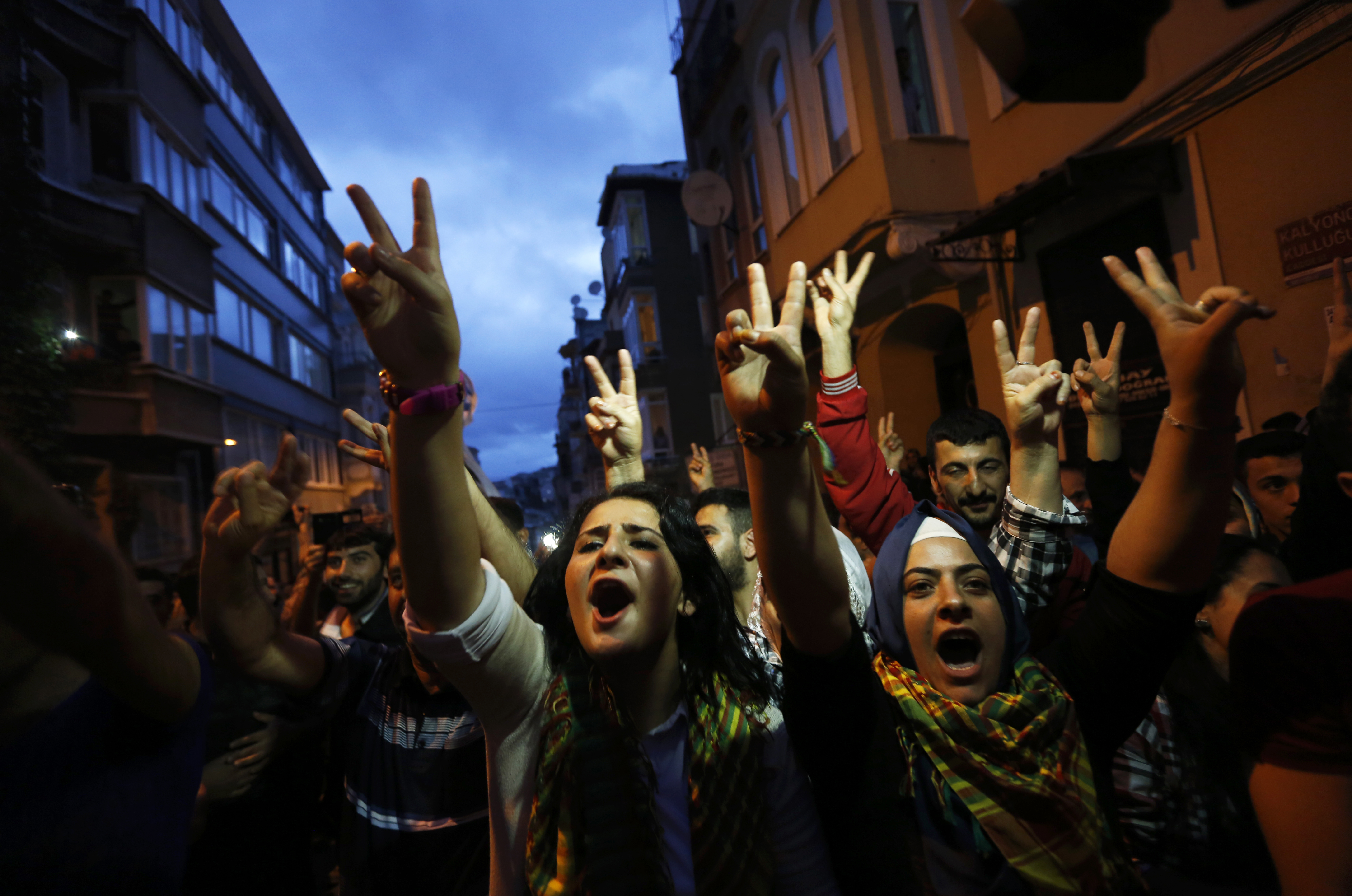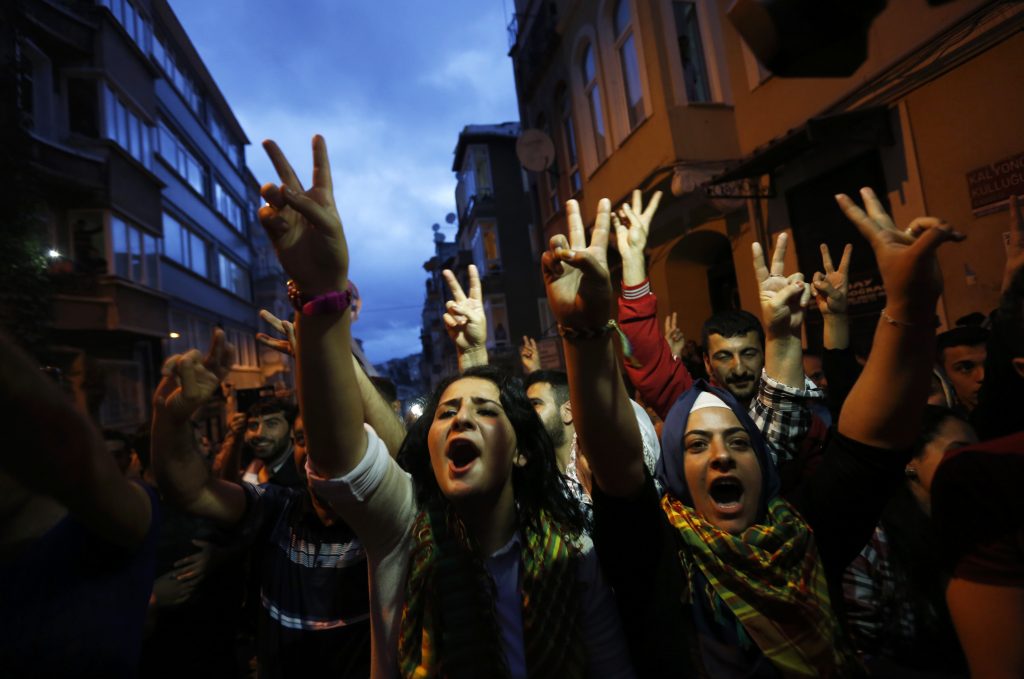 The wheel of politics goes round and round. Turkish voters demonstrated this in the thumping they gave in parliamentary elections June 7 to the Justice and Development Party (AKP) that had governed the country for over a decade.
The wheel of politics goes round and round. Turkish voters demonstrated this in the thumping they gave in parliamentary elections June 7 to the Justice and Development Party (AKP) that had governed the country for over a decade.
The AKP did win a 41 percent plurality and will take about 255 seats in the Turkish Grand National Assembly. However, it lost the majority it has held there since 2002. While in each national election since 2002, AKP has won a progressively larger share of the vote, this time it got less—nine points less than the nearly 50 percent of the vote it received in 2011.
The turn of Turkey’s political wheel represents a big setback for President Recep Tayyip Erdoğan who campaigned shamelessly for the AKP, his former home, despite a constitution and tradition that make the President’s role apolitical. Erdoğan had called for the party to achieve an unrealistic 400-seat majority, but what he really hoped for was 330 AKP MPs that would have enabled the party to change the constitution and replace the country’s parliamentary system with a strong presidency—led by Erdoğan. Prime Minister Ahmet Davutoğlu’s future looks clouded. Never particularly popular within the party, lacking charisma, and in any case unable to compete, including with Erdoğan, Davutoğlu seems set to be the AK Party’s fall guy.
The election result owes itself to a number of factors, the chief of which was the uncertainty and fracturing of AKP governance after Erdoğan moved from the prime ministry to the presidency last August. He and Davutoğlu publicly bickered. Policy making, especially on the economy, looked inconsistent, and the image of AKP invincibility seemed to fray. A political Midas, Erdoğan could no longer manage affairs in the same way; Turks like a leader, and theirs seemed out of place. Pictures of opulence and megalomania seemed to many people less like talismans of a great and successful Turkey and more like typical corruption and political overkill. The AKP had become the party of the status quo, a risky position in a dynamic and fast-changing political culture like Turkey’s.
Another factor was the success of the People’s Democratic Party (HDP), a Kurdish nationalist-focused party with roots in the violent and terrorist Kurdistan Workers’ Party (PKK). It garnered 13 percent of the vote and more than doubled its representation in parliament to about 80 seats, taking a large slice of the Kurdish vote that in the past went to the AKP and apparently also winning over urban liberals alienated by Erdoğan and AKP excess in recent years. The HDP is led by Selahattin Demirtaş, a figure more able to compete with Erdoğan in the political smarts and charisma departments than perhaps any other figure in the country.
Gone will be the era of single party government. To continue in office, the AKP will have to partner with the HDP, the Republican People’s Party (CHP), and/or the Nationalist Action Party (MHP). The country’s history with coalitions is rife with corruption and poor governance, but at least to start with, a new partnership now should reduce the political polarization that has dominated Turkey for years. At a minimum, the blaring dominion of Erdoğan will now have real competitors in public office.
Gone will be quite a few of the figures who have led Turkey’s government over the past decade. Economic czar and Deputy Prime Minister Ali Babacan is the best known. The fact of his departure and the prospect of jockeying and inconsistency in a new coalition government’s economic policies will add to the headwinds Turkey already faces and the scrutiny it receives from international financial markets.
Beyond these verities, however, much is uncertain. How will the Turkey’s new coalition building proceed? Which party or parties will join the AKP to form a new government—and at what price in terms of ministerial portfolios and policies? What will become of the Kurdish peace process that Erdoğan and Davutoğlu have pursued, even if haltingly, especially if the HDP is its coalition partner, or if it’s the MHP, which won 16 percent of the vote and strongly opposes that process? Will this election in fact produce a government? If a coalition cannot be formed in forty-five days, the President can call new elections, and already there is talk of this. Erdoğan can and will play many roles, but what will they be and how will they be received?
The implications of Turkey’s parliamentary election for US interests will be decidedly mixed. All the talk about authoritarianism and rising dictatorship made it harder to sustain a relationship with Turkey. That the ballot box still matters is a reminder that the country remains a democratic ally. Less polarization may make it easier for the US government and Ambassador to work complicated issues with Turkish leaders and citizens, who have made us scapegoats and whipping boys for years. However, each of the opposition parties that made gains in the election campaigned against the government’s foreign policies, especially regarding Syria, Iraq, and other regional issues. A subtext was opposition to Turkey’s partnership with the United States. For all the drama and occasional disconnects between Washington and Ankara, working together (or at least in parallel) has been more the reality than the exception. We should expect a rockier ride in the months to come.
Ross Wilson is a Distinguished Senior Fellow in the Atlantic Council’s Dinu Patriciu Eurasia Center. He served as the US Ambassador to Turkey from 2005 to 2008.
Image: Supporters celebrate early election results outside the pro-Kurdish Peoples' Democratic Party (HDP) headquarters in Istanbul, Turkey, June 7. (Reuters/Murad Sezer)
